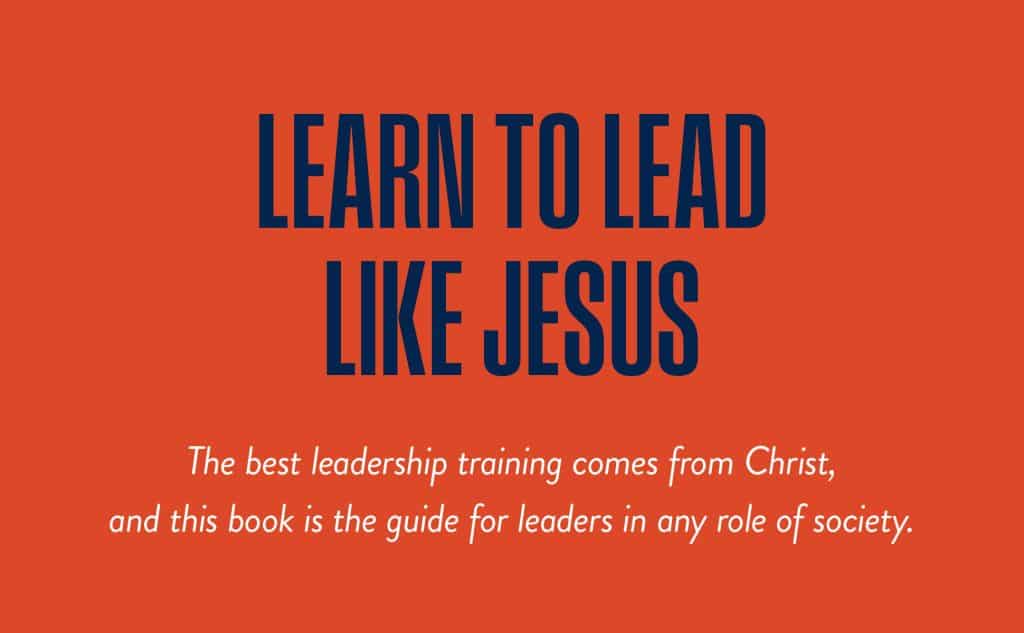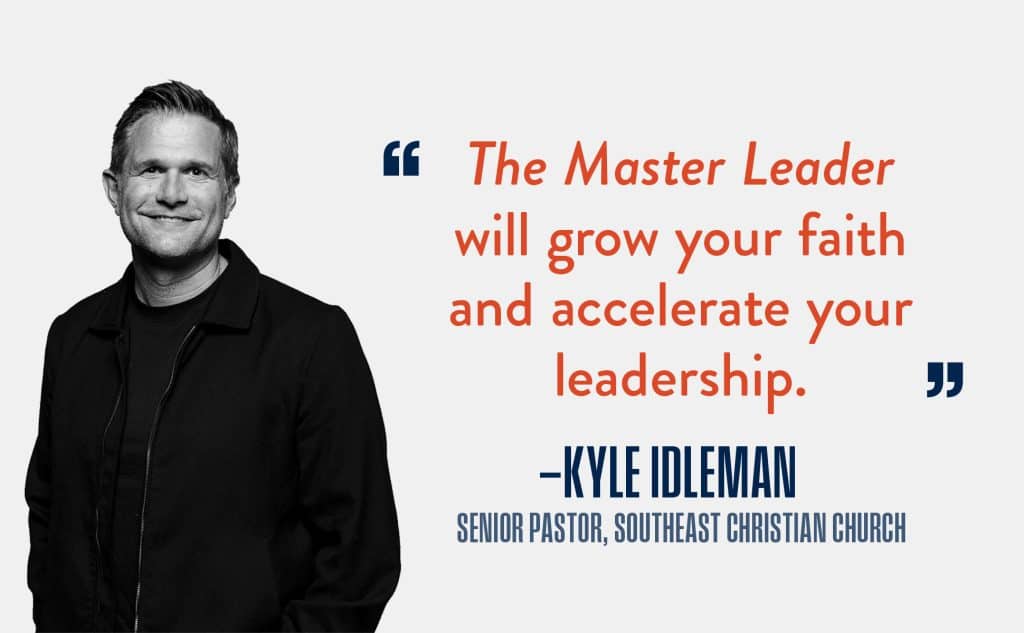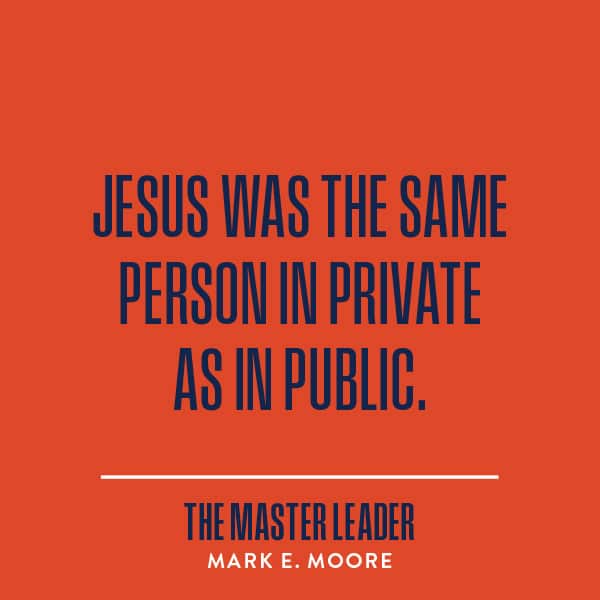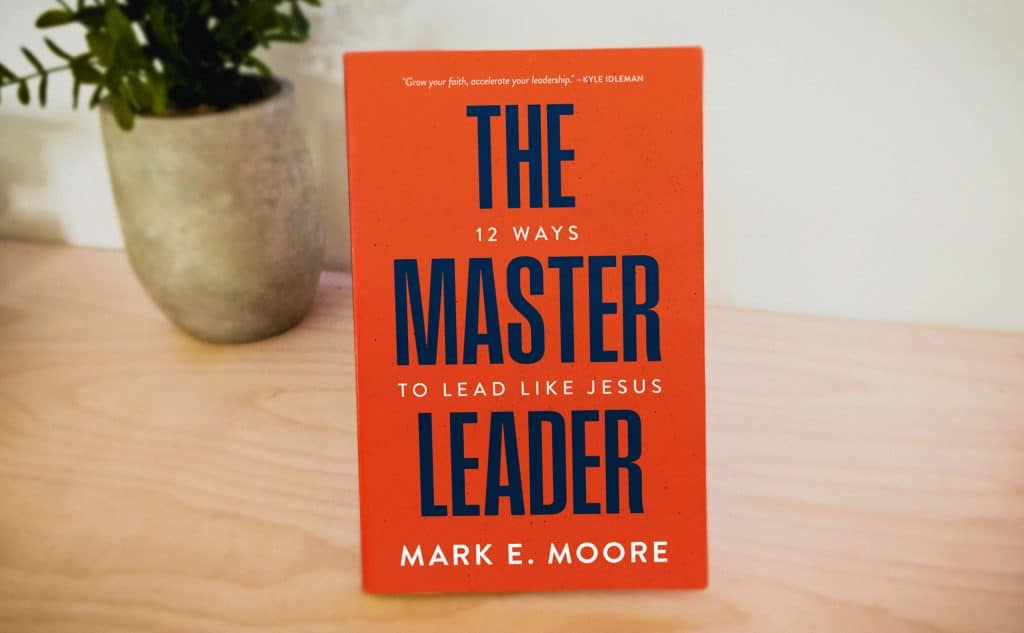Leadership Integrity: Building Trust Through Prayer, Rest, and Consistency
Listen to this episode above, Apple Podcasts or Spotify.
This is a modified excerpt from Chapter 1 “Integrity” of Mark E. Moore’s book, The Master Leader.
Purchase The Master Leader here.
The thirty-seventh president of the United States was massively successful. He ended a very unpopular war and normalized relations with China. Domestically, he was equally impactful—so powerful that he was reelected by a landslide in 1972. Undoubtedly, he would have gone down in history as one of America’s greatest presidents had it not been for a tiny glitch called Watergate.
After Richard Nixon’s reelection, the country learned that members of his party had broken into the Democratic National Headquarters to steal information that would help secure his reelection. Though Nixon didn’t order the break-in, subsequent audiotapes revealed he was complicit in covering it up.
Rather than facing impeachment, Nixon became the first president in U.S. history to resign his office. His name is now synonymous with duplicity and ignominy. Leadership is more than what you do on the public stage. It begins behind the scenes with who you arewhen no one is watching. Integrity is the foundation of trust and is essential to a legacy that lasts.
Richard Nixon’s resignation is etched in my memory. I recall watching from a black-and-white TV at a public swimming pool in the summer of 1974. I was eleven years old and as imperceptive as one would expect a tween to be.
Even so, I remember thinking, Oh no! If we can’t trust the president, who can we trust? Nixon didn’t merely destroy his own presidency; he irreparably damaged Americans’ respect for the office.
From that day to this, the esteem of the highest office in the country has diminished precipitously. It would be difficult to overestimate the importance of integrity in leadership. As James Kouzes and Barry Posner say, “If you don’t believe in the messenger, you won’t believe in the message.”[1] So before I answer the question “Where did Jesus’ integrity come from?” I want you to hear from Jeff as he speaks to what it means for a leader to have integrity.
Purchase The Master Leader here.
What Does Leadership Integrity Mean?
The following section was written by Jeff Osborne.
Sometimes we think of integrity as synonymous with morality. But it’s more than that. Integrity is not just doing the right things; it’s being the right person. Simply said, integrity is when the inside aligns with the outside. Ergo, as leaders, we must know what’s inside ourselves to have integrity.
What are we trying to model in and through our leadership?
Leading with integrity requires us to be crystal clear on the standards we want to uphold. And just as important, we must be aware of how our thoughts and actions are aligning to those standards.
As Christian leaders, we know to look to the Bible for the standards we should uphold. Though each of our leadership situations are nuanced and the Bible doesn’t always directly address our specific challenges, overarching principles of Scripture are relevant to any situation we find ourselves in. We must identify the standards of integrity we want to live out.
These standards will be a combination of attributes we know to be true from Scripture and the examples of what we’ve seen demonstrated through godly leaders—parents, teachers, coaches, etcetera. Let’s be honest: there are very few situations where it’s unclear if a leader is acting in ways that align with God’s standards.
Are we living out these standards?
To be certain, we must develop the muscle group of self-awareness. To do the right thing when no one is looking requires that we look honestly at ourselves first and be honest about what we see.
Over the decades of leading both individuals and organizations, I have realized that self-awareness is one of the most important skills to master. It’s also one of the greatest deficiencies in leaders today. Without strong self-awareness, we as leaders often find ourselves in a place of self-deception.
We want to do the right thing and truly believe we are doing the right thing, but due to our lack of self-awareness, we can easily fall into feeling like an imposter or poseur, that we are not being genuine to the values we believe to be true.
An example of this is when we act like a hard-nosed “tough guy” about a situation in a way we think will impress the leaders around us, but deep inside there is a caring person who wants to show compassion and empathy.
Self-awareness, though simple, is not always easy.
It requires us to ask for input, listen generously, and then have the humility to act on the input. In most leadership roles these days, getting feedback is not optional. It comes through performance reviews, one-on-one meetings, engagement surveys, and frank conversations with our leaders, peers, direct reports, family, and friends.
The challenge is not just asking for and receiving feedback but also leveraging that feedback into specific meaningful changes in our behaviors. These behaviors become the foundation of being a leader of integrity.
One of the most helpful tools for turning feedback into actionable change is a “blind-spot board.” This is nothing more than a list of our top five blind spots that can become liabilities if we don’t remain aware of them and counteract them wherever possible.
I created a blind-spot board for myself years ago. It is still displayed in my office for two main purposes: 1) to be a keen reminder for me of my blind spots, and 2) to allow my team to see them so they can hold me accountable. Blind spots can cause significant damage if we, as leaders, are unaware of them and do not find ways to mitigate them.
Here are a few examples of blind spots from my board…
Don’t get ahead of the team; listen, pause, respond—don’t react; don’t let perfection get in the way of progress (GETMO: Good Enough to Move On); spiking the ball on the five-yard line is a fumble, not a touchdown; and always finish.
Our leadership blind spots are not much different than the blind spots we encounter when driving a car. They keep us from seeing potential danger in our periphery. Blind spots cause collisions. The issue is not that we have blind spots (we all do); it’s that we don’t take time to check our blind spots.
As leaders, we tend to focus on our many strengths and not worry about our blind spots. Although we all should lean toward leveraging our strengths first, if we’re unaware of our blind spots, we can significantly diminish the effectiveness of our leadership to those we serve. It’s just too big a risk to ignore our blind spots.
Now that we are aware of how we are seen by others and of our blind spots, the key to maintaining integrity is to make sure we make the right next choice. Integrity involves knowing the right thing to do and then doing it.
When we lead, many of our daily decisions and actions feel isolated or separate from who we are as a leader, but they have a tremendous compounding effect when it comes to integrity. As Christian leaders, there are no small things, no insignificant decisions; there are all big decisions wrapped in small packages.
Jesus often focused on small and seemingly insignificant illustrations to help us understand that there are few decisions or behaviors that don’t matter. He reminds us of the significance of a small splinter in our own eye. If we have faith as small as a mustard seed, we can move mountains.
A couple of fish and a few loaves can feed thousands.
A simple deceit from Ananias about holding back money caused him and his wife to literally drop dead. Because each decision we make creates a ripple effect on those we lead, there are no unimportant or insignificant decisions as a Christian leader. We first must take care to ensure we know how we are behaving with heightened self-awareness and then be diligent to make sure we pay attention to make the right next choice, even in the small things.
Purchase The Master Leader here.
Where Did Jesus’ Leadership Integrity Come From?
Jeff’s perspective is invaluable as we turn now to the Gospels. No one questions that Jesus was a man of integrity. He lived his values. He was the same person in private as in public, with the wealthy as with the poor, with morally impeccable religious leaders as with cunning tax collectors. How was it that Jesus managed to have such integrity—to be so integrated in his values? It’s no secret. He talked about it frequently. His values, and his value, came from his Father in heaven.
Because Jesus talked so frequently about the Father, speaking about God as our Father feels normal, at least for Christians. In Jesus’ age, however, that was a radically revolutionary idea. It changed the landscape of religion. Until Jesus, no one imagined having a personal relationship with God. I would suggest that it is equally revolutionary today and never more needed.
Why? Because the greatest barrier to integrity is our fractured identity.
Our brokenness creates spiritual confusion when we try to meet competing and inappropriate expectations.
The good news is that Jesus provided a way for us to connect with our heavenly Father. We can find our identity in him as an antidote to the competing voices in the world around us attempting to impose a different identity on us. Therefore, as a starting point for integrity, leaders must find their identity and value in a Father who has already called, equipped, and approved them. That’s why we begin our investigation into Jesus’ leadership with his own identity.
Jesus’ Identity in the Gospels
Throughout the Gospels we see Jesus’ sense of intimate and personal connection with the Father. Look at the number of times he references his relationship.
The following chart is a summary of the data:
| Jesus Identified God As | Matthew | Mark | Luke | John | Total |
|---|---|---|---|---|---|
| “Father” | 39 | 4 | 22 | 103 | 168 |
| “My Father” | 18 | 1 | 8 | 44 | 71 |
Why does it matter that Jesus perceived himself as God’s Son? Because that’s where his identity came from. He didn’t need the approval of religious leaders. He didn’t fear the contagion of sinners. He didn’t have to self-promote or fight to protect himself. He was secure in his Father’s approval, fully free to live his life and carry out his calling with perfect integration and integrity—personally, professionally, and spiritually. The same can be true of you. By imitating Jesus, your leadership can be freed from inappropriate expectations and demands from others and from yourself.
Jesus’ identity as the “Son of God” allowed him to claim his rightful and exalted role without an ounce of arrogance or pride.
It allowed him to be in full submission to the Father’s authority without fear of losing his own independence. He had both bold confidence and radical humility because of his connection with his Father.
For years I struggled with my identity and felt the impact it had on my integrity. My father is a good and godly man, but due to his own upbringing and a painful divorce, he struggled with expressing his emotions. I carried that wound for decades.
In my college years, I excelled academically, partially out of a desperate need for approval from father figures. In my thirties, I found my professional achievements filling an emotional need that should have come more naturally from my marriage and children. It wasn’t until my forties that I began to accept the approval of my heavenly Father. This began to free me from the need for approval, which liberated me for more humble service, transparent vulnerability, and intimate friendships.
Purchase The Master Leader here.
This is but a brief glimpse through the window of my own soul that may serve as a mirror to your own. Hopefully, it’s a reminder of the impact your identity can have on your integrity. Powerful leaders can be driven by insecurity rather than divine responsibility. Many times I have witnessed how insecurity can jeopardize a leader’s integrity, putting their legacy at risk.
To lead with maximized integrity, we must follow Jesus’ example and find our identity in being a child of our heavenly Father.
As we do this, we can live under the Father’s authority, building both confidence and humility, which in turn, empower our integrity.
Below is a sampling of what being under the Father’s authority meant for Jesus’ ministry. Take a moment to circle or highlight two or three principles that you could implement immediately into your leadership practices to make the most impact most quickly.
- Jesus delegated authority based on his Father’s revelation: “I assign to you, as my Father assigned to me, a kingdom, that you may eat and drink at my table in my kingdom and sit on thrones judging the twelve tribes of Israel” (Luke 22:29–30; see also Matt. 16:17–18; 18:19; 20:23).
- Jesus prioritized people based on God’s priorities: “See that you do not despise one of these little ones. For I tell you that in heaven their angels always see the face of my Father who is in heaven” (Matt. 18:10; see also Matt. 18:14; John 10:29).
- Jesus submitted to suffering because of his Father’s will: “And going a little farther he fell on his face and prayed, saying, ‘My Father, if it be possible, let this cup pass from me; nevertheless, not as I will, but as you will’” (Matt. 26:39; see also John 10:18).
- Jesus was secure enough in his identity to submit to his Father’s will: “All things have been handed over to me by my Father, and no one knows who the Son is except the Father, or who the Father is except the Son and anyone to whom the Son chooses to reveal him” (Luke 10:22).
- Jesus’ self-confidence empowered his endurance as he imitated his Father: “My Father is working until now, and I am working” (John 5:17; see also John 10:37).
- Jesus was glorified only by his Father: “If I glorify myself, my glory is nothing. It is my Father who glorifies me, of whom you say, ‘He is our God’” (John 8:54).
- Jesus freely communicated what his Father shared with him: “No longer do I call you servants, for the servant does not know what his master is doing; but I have called you friends, for all that I have heard from my Father I have made known to you” (John 15:15).
Each of these connections with the Father reveals Jesus’ integrity as a leader that flowed from his confident identity. Knowing who you are as a leader is of paramount importance. Warren Bennis and Robert Thomas make this observation: “When the 75 members of the Stanford graduate school of businesses advisory council were asked to recommend the most important capability for leaders to develop, their answer was nearly unanimous: self-awareness.”[2]
Purchase The Master Leader here.
Our Leadership Integrity
How does all this relate to our integrity as leaders? A common misconception of leadership is that leadership leads to freedom. As you probably know, it does not. Leadership is not “freedom from” but “freedom to.” We have the freedom to carry out obligations. It’s the people you feel obligated to who will determine your level of integrity. If you feel obligated to an unethical boss, you’ll lose integrity. If you feel obligated to your own pride, it will lead to catastrophic mismanagement. If you feel you have multiple competing obligations—family, lust, greed, reputation—you will lose integrity to multiple masters.
For example, leaders are often blinded by the sycophantic praise of their followers who hope to cling to their coattails for success and significance. Church leaders are certainly not immune to this.
We are often more vulnerable because the praise of men is in the shadow of the Almighty who has ordained us to lead—or so we believe. It’s easy to lose ourselves if we’re not connected to the Father and obligated first and foremost to him.
If your exclusive obligation is to your heavenly Father, he will not only endow you with his authority; he will also grant you his unmitigated approval. You can, therefore, be free to serve, free to obey, free to give, free to speak hard truths, and free to delegate.
It’s this “freedom to” that comes from God the Father and brings uncompromised integrity in our leadership.
Chapter Summary
Integrity is the foundation of leadership. It is not just doing the right things; it’s being the right person—aligning our actions with God’s values. This seems simple enough. However, without a clear view of the Father and close connection to him, the values we want to embody can become mere rules; and rules without relationship typically lead to rebellion.
As we come to know the Father, we sense his approval and love. His value of us allows his values to live in us, resulting in a life of integrity. It also develops a deep humility—a humility that enables us to serve others sacrificially. We’ll talk about this servanthood in the next chapter.
For access to “The Father Index: Uncover the Influence of Your Earthly and Heavenly Fathers” and “Personal Declaration: Create a Blueprint for Your Identity,” purchase The Master Leader here.
Notes
[1]. James Kouzes and Barry Posner, The Leadership Challenge: How to Make Extraordinary Things Happen in Organizations, 5th ed. (San Francisco: Jossey-Bass, 2012), 38.
[2]. In Bill George, Peter Sims, Andrew McLean, and Diana Mayer, “Discovering Your Authentic Leadership,” in HBR’s 10 Must Reads on Leadership (Boston: HBR, 2011), 168.






